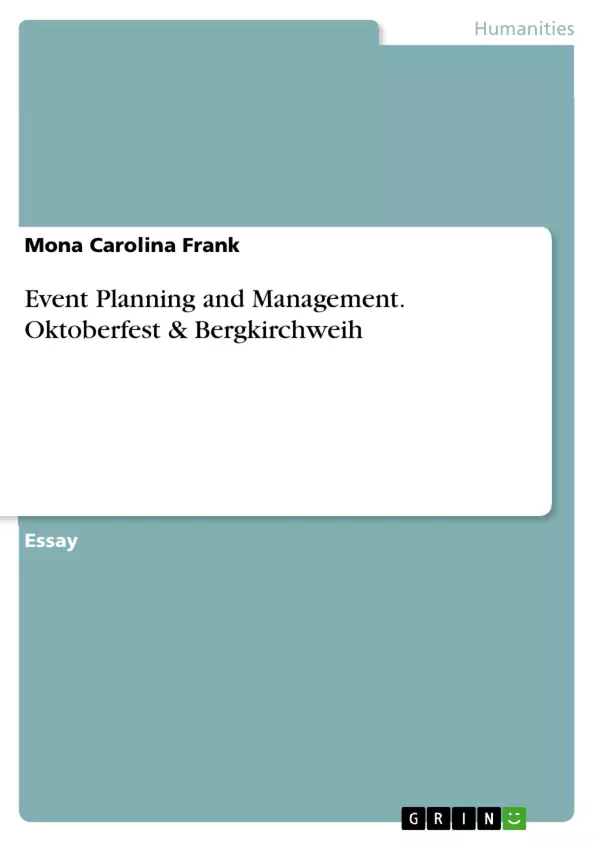This research critically evaluates the value of events to cultural tourism from a cultural values perspective and how it reaffirms and celebrates cultural identity using two of the biggest beer festivals in Germany as examples. Germans are justifiably proud of their great beer history and longstanding beer tradition and beer is even considered the country’s national drink. The Oktoberfest in Munich, which is the biggest and certainly most famous beer festival of all, attracts millions of tourists from all over the world and started traditionally as a royal wedding celebration. Erlangen, a small town in the northern part of Bavaria has been celebrating the Bergkirchweih for centuries, a beer fest that celebrates the culture and the traditional customs of beer brewing.
Cultural tourism can be defined broadly as the commercialised manifestation of the human desiring to see how others live. Cultural identities come from somewhere, have histories, but like everything which is historical, they undergo constant transformation. A more fastidious and sophisticated tourism demand has emerged, looking for more complex tourist product than just a "sun, sea and sand" holiday package. Such trends have encouraged development of many diverse activities for tourists wrapped in various forms of special interest tourism, such as cultural tourism.
There is to say that the concern of tourism creating a false cultural identity of the host population became true when looking at the Oktoberfest, while the Bergkirchweih managed to reinforce the area’s indigenous cultural identity better. But of course, tourism development always involves the risk of an alteration in the local cultural identity. It is certainly not possible to achieve both a cultural significance and growing visitor numbers.
Inhaltsverzeichnis (Table of Contents)
- A) Introduction
- B) Review of topic
- a) Example 1: Oktoberfest
- b) Example 2: Bergkirchweih
- C) Findings
- D) Implications and relevance to the events industry
- E) Conclusion
- F) References
Zielsetzung und Themenschwerpunkte (Objectives and Key Themes)
This research examines the value of events to cultural tourism, specifically from the perspective of cultural values and their role in reaffirming and celebrating cultural identity. The research uses two major beer festivals in Germany, Oktoberfest and Bergkirchweih, as case studies to illustrate this relationship.
- The significance of events in shaping and reinforcing cultural identity
- The relationship between cultural tourism and the preservation of cultural values
- The impact of tourism on local cultural identities
- The potential for events to create a false cultural identity
- The challenge of balancing cultural authenticity with tourism growth
Zusammenfassung der Kapitel (Chapter Summaries)
The paper begins with an introduction highlighting the importance of beer culture in Germany and its significance as a national drink. It then delves into the review of topic, focusing on two prominent beer festivals: Oktoberfest and Bergkirchweih.
The Oktoberfest chapter examines the festival's history, its evolution into a global phenomenon, and its impact on Munich's cultural landscape. It also discusses the financial aspects of the festival, including the cost of food and drinks. The chapter concludes by emphasizing the unique atmosphere of the Oktoberfest, which is difficult to replicate elsewhere.
Schlüsselwörter (Keywords)
Key terms and concepts explored in this research include cultural tourism, cultural values, cultural identity, event planning, event management, beer festivals, Oktoberfest, Bergkirchweih, Germany, authenticity, tourism development, and cultural preservation.
Frequently Asked Questions
What is the difference between Oktoberfest and Bergkirchweih?
Oktoberfest is a massive global phenomenon that some argue creates a "false" cultural identity, while Bergkirchweih in Erlangen is seen as better reinforcing indigenous local traditions.
How do events contribute to cultural tourism?
Events like beer festivals celebrate and reaffirm cultural identity, attracting tourists who seek complex cultural experiences beyond traditional holidays.
What is the risk of tourism for local cultural identity?
Tourism development often involves the risk of altering or commercializing local customs to the point where the original authenticity is lost.
Can cultural significance be maintained with growing visitor numbers?
The research suggests it is difficult to achieve both high cultural authenticity and massive visitor growth simultaneously.
Why is beer considered a national drink in Germany?
Due to a long-standing history and tradition of brewing, beer is a central element of German social life and cultural heritage.
- Quote paper
- Bachelor of Arts Mona Carolina Frank (Author), 2012, Event Planning and Management. Oktoberfest & Bergkirchweih, Munich, GRIN Verlag, https://www.grin.com/document/288912



